Lower Blood Sugar Naturally: 11 Science-Backed Tips
From managing diet to exercising - simple tips to regulate blood pressure at home.
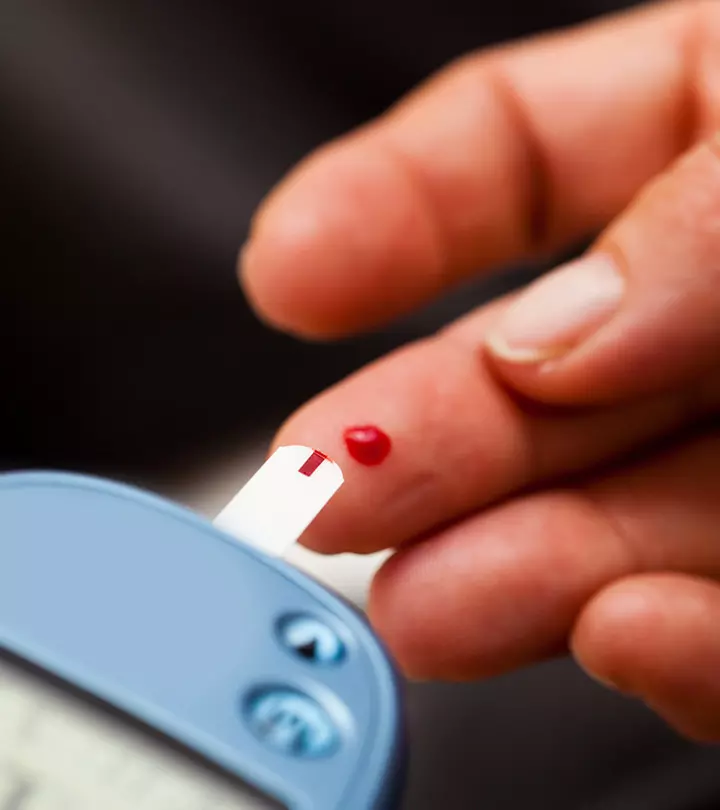
Image: iStock
Glucose or blood sugar is essential for the proper functioning of your body. The problem arises when the levels of blood sugar deviate from what is considered to be a healthy range. Diabetes or prediabetes, a chronic health concern associated with high blood sugar, is on the rise today. Lifestyle and food choices can have an effect on your blood sugar levels, and that is why it may be possible to lower blood sugar naturally. It is important to understand the mechanism behind a rise in blood sugar levels to know how to bring blood sugar down, so let’s get into the details.
In This Article
What Causes High Blood Sugar?
High blood sugar, or hyperglycemia, refers to a blood glucose (sugar) level higher than 125 mg/dL in a fasted state (minimum 8 hours) and higher than 180 mg/dL two hours after food intake
(1). There are two primary reasons why your blood sugar may be high:
1. You have insulin resistance.
2. Your body is not producing enough insulin.
Insulin, a hormone secreted by the pancreas, is responsible for managing the level of glucose in the blood. There can be a variety of factors behind abnormalities in insulin production or usage. Depending on those, you may be diagnosed as having type 1 diabetes, type 2 diabetes, or gestational diabetes.
- Type 1 Diabetes
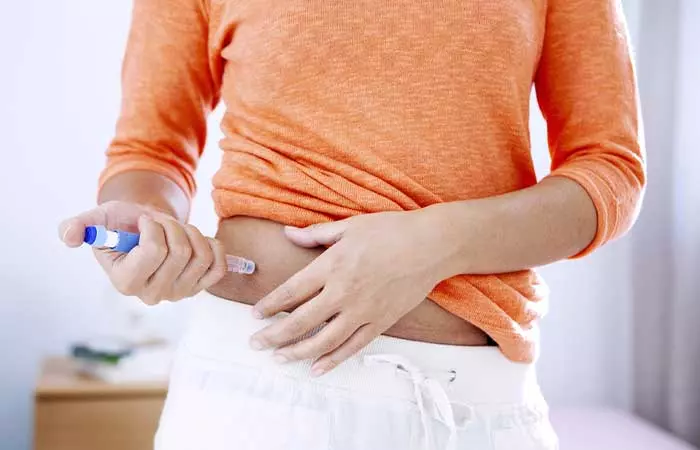
Type 1 diabetes is an auto-immune disorder in which the body’s immune system attacks and impairs the cells responsible for insulin production. The exact reason why this happens is not known, but research suggests that genetics and environment are important factors. Type 1 diabetes mostly develops in childhood or adolescence (2).
- Type 2 Diabetes
The exact cause behind type 2 diabetes is unknown, but obesity, a sedentary lifestyle, and waist circumference are strongly linked with the development of type 2 diabetes.
This is the most prevalent form of diabetes in the U.S. Other risk factors include exposure to environmental toxins, and a family history of type 2 diabetes, hypertensioni A condition in which the flow of blood against the arteries is more than normal. Also known as high blood pressure. , and certain diseases like Cushing syndromei A disorder caused due to prolonged and excessive production of cortisol hormones by the adrenal glands. , pancreatitisi Inflammation of the pancreas that occurs when digestive enzymes latch on to it due to alcoholism or gallstones. , and cancer (3).
- Gestational Diabetes
Gestational diabetes may affect some women during pregnancy.
It generally presents itself if the body becomes less sensitive to insulin. This condition clears up after delivery (4).
According to available data, diabetes was the seventh leading cause of death in the United States in 2019. Around 37.3 million Americans (11.3% of the population) had diabetes in the same year, of which 8.5 million were undiagnosed. On an average, 1.4 million Americans are diagnosed with diabetes every year.
It is important to pay attention to your body to know if your blood sugar levels are fluctuating or going above normal. Let’s explore some signs through which your body may communicate that to you.
Key Takeaways
- The blood sugar levels become high if the body has insulin resistance, or fails to produce enough insulin.
- You may experience headaches, fatigue, blurry vision, excessive hunger, and difficulty concentrating and thinking if your blood sugar levels are high.
- Exercise regularly, opt for a low-carb diet, consume enough fiber, drink plenty of water, and have a sound sleep to lower blood sugar levels naturally.
- Incorporating stress-reducing practices like yoga and prioritizing sufficient sleep can be a game-changer, significantly improving your blood sugar control and overall health.
How Do You Feel When Your Blood Sugar Is Too High?

You may feel excessively thirsty and urinate frequently as the first indication that your blood glucose levels are high. Some other common signs and symptoms of hyperglycemia include (1):
- Headache
- Fatigue
- Blurry vision
- Excessive hunger
- Difficulty in concentration and thinking
Hyperglycemia is especially important to identify if you have type 1 diabetes. Untreated, it can lead to ketoacidosis, an emergency medical condition that may be fatal. Rush to the emergency ward if you experience any of these signs of ketoacidosis (5):
- Dehydration
- Vomiting
- A fruity breath
- Hyperventilationi A condition which causes rapid breathing, leading to dizziness and breathlessness as a result of panic or anxiety.
- Very fast heartbeat
- Disorientation
High blood sugar levels may also lead to diabetic kidney disease that can damage the kidney’s filtering systems and lead to kidney failure (6). You may not observe any noticeable symptoms in the early stages of kidney dysfunction. However, as the disease progresses, you may experience:
- Fatigue
- Nausea
- Swelling in the ankles
- Difficulty in sleeping
- Shortness of breath
- Confusion
- Increased need to urinate
- Poor appetite
 Did You Know?
Did You Know?While neither type 1 nor type 2 diabetes is curable, both can be treated and managed. Besides medications that your physician may prescribe, lifestyle changes and diet can have a great impact on hyperglycemia and help you manage blood sugar levels naturally (7).
How To Manage Blood Sugar Levels Naturally
1. Incorporate Regular Physical Activity Into Your Routine
Exercising regularly can not only help you with weight management but also improve your insulin sensitivity. Research suggests that physical exercise may help prevent insulin insensitivity (8). An improved insulin sensitivity translates to lower levels of glucose in your blood as cells are able to utilize the sugar better. Physical training also helps your muscles use up more blood sugar. Walking at a brisk pace, swimming, weightlifting, running, cycling, hiking, and dancing are examples of exercises that may help you manage blood sugar levels naturally.
Caution: To become familiar with how your blood glucose responds to exercise, you may monitor it before and after exercise. This will give you an idea about how your blood sugar levels fluctuate, especially if you are on any medication to help manage your hyperglycemia.
2. Try A Low-carb Diet

Carbohydrates break down into sugars during the digestive process. Insulin is responsible for managing how much sugar is used and how much is stored. If you consume too many carbohydrates, or if you have insulin-related problems, you may end up with high blood sugar. Research suggests that eating meals with fewer carbohydrates is one of the most effective ways to lower blood sugar and reduce weight at the same time (9). The best part is that it’s not only good for the short term but may have long-term beneficial effects on blood sugar management as well (10).
Dr. Jody Stanislaw, a blogger, wrote how eating a diet rich in proteins, healthy fats, vegetables and low in carbohydrates helped her manage her blood sugar levels. She said, “I have the freedom to enjoy so many delicious foods now without ever having to strictly weigh or measure them. I also love allowing myself to eat as many low-carb vegetables as I want. This helps me feel less restricted (i)”.
You can follow an insulin resistance diet to lower blood sugar levels. Here are a few more things you may do to keep your carb intake in check:
- Count your macronutrientsi Essential nutrients the body needs to generate energy and maintain bodily functions. They include carbohydrates, fats and proteins. and be aware of how much carbohydrate you need based on your BMI.
- Reduce added sugar by drinking your coffee or tea without it.
- Practice portion control.
- Eat whole foods, preferably home-cooked meals.
- If you have to eat out, choose healthier options that focus on vegetables and lean protein.
- Replace sugary snacks with nuts and seeds.
3. Load Up On Fiber
Dietary fiber, especially soluble fiber, can help you manage your blood glucose levels. It can slow down the digestion of carbohydrates and the rate at which sugar is absorbed into your bloodstream. This can help you avoid a sudden rise in your blood sugar level. Soluble dietary fiber is also associated with improved insulin resistance (11), (12), (13).
A diet high in fiber can also help manage type 1 diabetes by improving blood sugar regulation and reducing the chance of sudden drops in blood sugar levels (12), (14). Include vegetables, fruits, legumes, and whole grains in your meals as they are high in fiber content.
4. Manage Your Weight
Research suggests that even a 7% reduction in body weight may lower the risk for developing diabetes by as much as 58%. It also concludes that managing weight and incorporating physical activity as a part of lifestyle modification may work even better at lowering blood sugar levels compared to a commonly prescribed drug for diabetes (15).
As waistline measurement is a crucial factor in the estimation of diabetes risk, it is important that you keep an eye on your waistline. A measurement of greater than 35 inches for women and greater than 40 inches for men may increase the risk of hyperglycemia and type 2 diabetes (16).
5. Stay Hydrated And Drink More Water
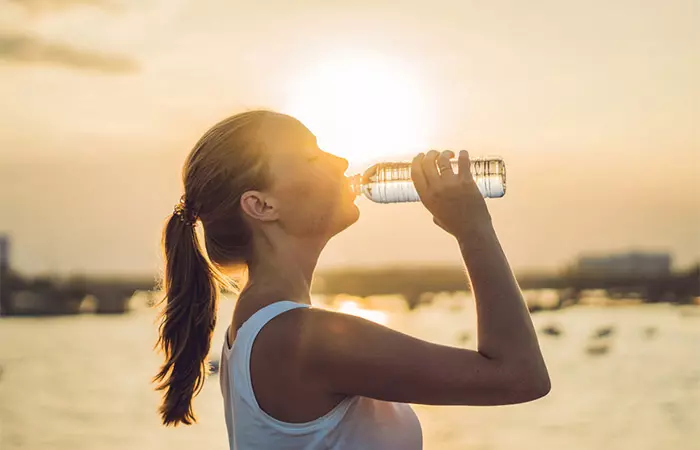
Drinking water throughout the day may help to prevent raised blood sugar levels as water enables your kidneys to flush out any excess sugar via urine. According to a study, people who drink more water are less likely to develop hyperglycemia (17). Rehydrating with plain water or mineral water may be a way to lower your blood sugar and reduce the risk of developing diabetes (18).
6. Practice Stress Management
According to research, stress can directly affect your blood glucose levels. Glucagon and cortisol, two hormones that are released under stress, can cause your blood sugar levels to rise (19), (20). A study conducted on students showed that regular exercise, meditation, and relaxation reduced both stress levels as well as blood glucose (21). Additionally, there is some evidence that stress reduction through yoga and mindfulness meditation may correct problems related to insulin secretion in those who have chronic diabetes (22), (23).
7. Sleep Enough And Sleep Well
Bad sleeping habits and insufficient sleep can influence your appetite, affect insulin sensitivity and raise your blood sugar levels. When your body is sleep-deprived, it releases lower amounts of growth hormones and increases the levels of cortisol in the blood. Both these hormones play important roles in blood sugar management (24), (25). Focus on getting good quality and sufficient quantity of sleep every day.
 Quick Tip
Quick Tip8. Add Apple Cider Vinegar And Cinnamon To Your Diet
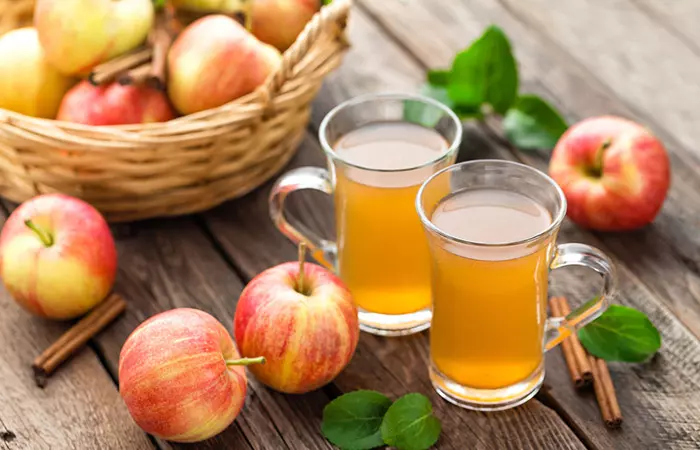
Apple cider vinegar or ACV may promote a decrease in fasting blood glucose levels. Studies show that ACV can significantly influence how the body responds to sugars and may also improve insulin sensitivity (26), (27). You can drink ACV by diluting it in water or as a salad dressing.
Similarly, cinnamon may help you lower blood sugar naturally by reducing insulin resistance at the cellular level (28), (29). There is some evidence that cinnamon may reduce blood glucose by up to 29% (30). Adding cinnamon to your meals may slow down the digestion of carbohydrates and hence lead to a more regulated rise of sugar levels in your blood after eating (31). Consult your healthcare provider before introducing them to your diet if you are already on medications to manage blood sugar.
9. Drink Aloe Vera Juice
Incorporating aloe vera into your diet may help lower your blood sugar levels. Studies showed aloe vera helped reduce fasting blood glucose and hemoglobin A1C levels in patients with prediabetes and non-treated diabetes (32). Further studies suggest that in addition to improving fasting sugar levels, regular consumption of aloe vera may also help in weight and fat loss (33). You may add freshly obtained aloe vera gel to smoothies, drink its juice, or consume aloe vera supplements after consulting with your healthcare provider.
10. Load Up On Magnesium
Magnesium plays a vital role in the insulin signaling process. Adequate magnesium levels are linked to increased insulin sensitivity (34). One study found that magnesium supplementation reduces insulin resistance and improves glycemic control among people with type-2 diabetes (35).
11. Monitor Your Blood Glucose Levels
Monitoring your blood sugar levels regularly is a vital part of managing your health. Use a glucometer to measure your blood sugar levels as your physician directs. By keeping a record of your blood sugar readings, you can identify trends and triggers that impact it, and make better dietary and lifestyle choices. This approach, combined with the support and guidance of your healthcare provider, can help adjust your treatment plan, ensuring optimal control of your blood sugar levels.
In addition to incorporating these changes in your diet patterns and lifestyle, you can make better choices with respect to the foods you consume to have a regulatory impact on your blood glucose levels.
Note: The information in this article is not a substitute for medical advice, and anyone who is concerned about their blood sugar levels must talk to their doctor first.
What Foods Will Help Regulate My Blood Sugar?
Foods with a low or moderate glycemic index can help you regulate your blood glucose levels. Glycemic index is a measure on a scale of 0-100 of how long it takes for the body to digest food, and hence how quickly it raises blood sugar levels. A study shows that people who consumed low-glycemic food had steady blood glucose levels over a 24-hour period, and had a reduction in food intake (36).
However, it is also important that you consume even low glycemic foods in moderation, as the amount of carbohydrates you consume impacts how much sugar gets released in your blood (37). Recommended calorie intake for people with a BMI above normal and hyperglycemia is between 800 Kcal and 1500 Kcal. Some foods with a low to moderate glycemic index include (38):
- Leafy greens
- Non-starchy vegetables like bell peppers, tomatoes, and leafy greens
- Yogurt, cheese, and unsweetened milk
- Most fruits
- Lean protein like chicken and fish
- Eggs
- Complex unprocessed carbohydrates like oats, bran, and wholewheat bread
- Nuts and seeds
Once you start incorporating these, you may notice your blood sugar levels go down gradually. However, individual responses to dietary changes can vary and the effectiveness of these foods may be different among individuals. Consult your doctor before switching to any diabetes diet plan.
How Long Will It Take To Lower My Blood Sugar?
There is no one-size-fits-all answer to this as how long it takes blood sugar levels to come down depends on a number of factors like:
- Your baseline weight and how much weight you have lost.
- The kind of diet you are on.
- Whether or not you are taking medication.
- Whether you have included exercise and if yes, what kind.
With proper dietary and lifestyle intervention, you may have a reduction in your weight and blood sugar levels even within 3 weeks, according to a study (39).
Frequently Asked Questions
Can apple cider vinegar lower blood sugar immediately?
Yes, apple cider vinegar may help lower blood sugar levels within 30 minutes of consumption (40).
Does peanut butter lower blood sugar?
While peanut butter cannot lower blood sugar, intake of peanut butter may help improve satiety and reduce appetite, which, in turn, can lead to improved blood sugar levels (41).
Does lemon juice lower blood sugar?
Lemon juice can help improve the glycemic impact of carbohydrate-rich meals and prevent spikes in blood sugar levels (42).
Does turmeric help with diabetes?
Yes, turmeric may lower blood sugar concentrations, stabilize blood sugar levels and help prevent or manage diabetes (43).
Does garlic lower blood sugar?
Yes, garlic can improve fasting blood sugar levels and lower blood sugar when consumed regularly ( 44).
Need to lower your blood sugars fast? Discover practical and effective strategies to bring it down. Don’t wait—click the video to watch the ultimate guide and take control of your health today!
In a nutshell, having high blood sugar levels (hyperglycemia) puts you at risk of diabetes and other serious health conditions. There are three factors you must pay attention to if you want to manage your blood sugar naturally: how effectively your body is producing insulin, how effectively your insulin is working, and how much sugar are you consuming versus using up as fuel. Hyperglycemia is treatable in many cases by incorporating exercise, and dietary changes. You should focus on low-carbohydrate diets and eat more nutrient-rich foods with a low glycemic index. It is also important to get proper hydration, sleep, and reduced stress levels through yoga and mindfulness meditation. That said, consult your doctor before making any changes to your diet or lifestyle. This can help better manage your blood sugar levels effectively and safely.
Personal Experience: Source
StyleCraze's articles are interwoven with authentic personal narratives that provide depth and resonance to our content. Below are the sources of the personal accounts referenced in this article.
i. How to Eat Healthy and Feel Great with Type 1 Diabeteshttps://medium.com/@dr.jodynd/how-to-eat-healthy-and-feel-great-with-type-1-diabetes-368ce2759f9
References
Articles on StyleCraze are backed by verified information from peer-reviewed and academic research papers, reputed organizations, research institutions, and medical associations to ensure accuracy and relevance. Read our editorial policy to learn more.
- Hyperglycemia
https://www.ncbi.nlm.nih.gov/books/NBK430900/ - Type 1 Diabetes – A Clinical Perspective
https://www.ncbi.nlm.nih.gov/labs/pmc/articles/PMC5606981/ - Type 2 Diabetes Mellitus: A Review of Current Trends
https://www.ncbi.nlm.nih.gov/labs/pmc/articles/PMC3464757/ - Gestational diabetes: A clinical update
https://www.ncbi.nlm.nih.gov/labs/pmc/articles/PMC4515446/ - Diabetic ketoacidosis: clinical presentation and precipitating factors at Kenyatta National Hospital Nairobi
https://www.ajol.info/index.php/eamj/article/view/9381 - Diabetic kidney disease
https://idp.nature.com/authorize?response_type=cookie&client_id=grover&redirect_uri=https%3A%2F%2Fwww.nature.com%2Farticles%2Fnrdp201518 - The prevention and control the type-2 diabetes by changing lifestyle and dietary pattern
https://www.ncbi.nlm.nih.gov/labs/pmc/articles/PMC3977406/ - Exercise and insulin sensitivity: a review
https://pubmed.ncbi.nlm.nih.gov/10683091/ - Dietary carbohydrate restriction as the first approach in diabetes management: Critical review and evidence base
https://www.sciencedirect.com/science/article/pii/S0899900714003323 - Low-carbohydrate diet in type 2 diabetes: stable improvement of bodyweight and glycemic control during 44 months follow-up
https://pubmed.ncbi.nlm.nih.gov/18495047/ - Beneficial effects of high dietary fiber intake in patients with type 2 diabetes mellitus
https://pubmed.ncbi.nlm.nih.gov/10805824/ - Effects of stabilized rice bran its soluble and fiber fractions on blood glucose levels and serum lipid parameters in humans with diabetes mellitus Types I and II
https://pubmed.ncbi.nlm.nih.gov/11893482/ - Therapeutic effects of soluble dietary fiber consumption on type 2 diabetes mellitus
https://www.ncbi.nlm.nih.gov/labs/pmc/articles/PMC4950069/ - Evidence-Based Nutrition Principles and Recommendations for the Treatment and Prevention of Diabetes and Related Complications
https://care.diabetesjournals.org/content/25/1/148 - The Diabetes Prevention Program (DPP)
https://www.ncbi.nlm.nih.gov/labs/pmc/articles/PMC1282458/ - Waist Circumference and Cardiometabolic Risk
https://care.diabetesjournals.org/content/30/6/1647.full - Low water intake and risk for new-onset hyperglycemia
https://pubmed.ncbi.nlm.nih.gov/21994426/ - Prevention and Therapy of Type 2 Diabetes—What Is the Potential of Daily Water Intake and Its Mineral Nutrients?
https://www.ncbi.nlm.nih.gov/labs/pmc/articles/PMC5579707/ - Minireview: Glucagon in Stress and Energy Homeostasis
https://www.ncbi.nlm.nih.gov/labs/pmc/articles/PMC3281544/ - The longitudinal association of changes in diurnal cortisol features with fasting glucose: MESA
https://www.sciencedirect.com/science/article/abs/pii/S0306453020301177?via=ihub%22%20%5Ct%20%22_blank - Effects of yogic exercises on life stress and blood glucose levels in nursing students
https://pubmed.ncbi.nlm.nih.gov/25540518/ - Mindfulness-based stress reduction is associated with improved glycemic control in type 2 diabetes mellitus: a pilot study
https://pubmed.ncbi.nlm.nih.gov/17900040/ - Sustained effects of a mindfulness-based stress-reduction intervention in type 2 diabetic patients: design and first results of a randomized controlled trial (the Heidelberger Diabetes and Stress-study)
https://pubmed.ncbi.nlm.nih.gov/22338101/ - Slow-wave sleep diabetes and the sympathetic nervous system
https://www.pnas.org/doi/10.1073/pnas.0711635105 - Slow-wave sleep and the risk of type 2 diabetes in humans
https://pubmed.ncbi.nlm.nih.gov/18172212/ - Effect and mechanisms of action of vinegar on glucose metabolism lipid profile and body weight
https://pubmed.ncbi.nlm.nih.gov/25168916/ - Vinegar improves insulin sensitivity to a high-carbohydrate meal in subjects with insulin resistance or type 2 diabetes
https://care.diabetesjournals.org/content/27/1/281 - Cinnamon: Potential Role in the Prevention of Insulin Resistance Metabolic Syndrome and Type 2 Diabetes
https://www.ncbi.nlm.nih.gov/labs/pmc/articles/PMC2901047/ - The Effect of Different Amounts of Cinnamon Consumption on Blood Glucose in Healthy Adult Individuals
https://www.ncbi.nlm.nih.gov/labs/pmc/articles/PMC6425402/ - The potential of cinnamon to reduce blood glucose levels in patients with type 2 diabetes and insulin resistance
https://pubmed.ncbi.nlm.nih.gov/19930003/ - Cinnamon extract inhibits α-glucosidase activity and dampens postprandial glucose excursion in diabetic rats
https://pubmed.ncbi.nlm.nih.gov/21711570/ - Efficacy of Aloe Vera Supplementation on Prediabetes and Early Non-Treated Diabetic Patients: A Systematic Review and Meta-Analysis of Randomized Controlled Trials
https://www.ncbi.nlm.nih.gov/pmc/articles/PMC4963864/ - Evaluation of biological properties and clinical effectiveness of Aloe vera: A systematic review
https://www.sciencedirect.com/science/article/pii/S2225411014000078?via%3Dihub - Association of vitamin D and magnesium with insulin sensitivity and their influence on glycemic control
https://www.ncbi.nlm.nih.gov/pmc/articles/PMC9850798/ - The Effects of Oral Magnesium Supplementation on Glycemic Response among Type 2 KDiabetes Patients
https://www.ncbi.nlm.nih.gov/pmc/articles/PMC6356710/ - The impact of a low glycemic index (GI) breakfast and snack on daily blood glucose profiles and food intake in young Chinese adult males
https://www.sciencedirect.com/science/article/pii/S2214623715000563 - Dietary carbohydrate (amount and type) in the prevention and management of diabetes: a statement by the american diabetes association
https://pubmed.ncbi.nlm.nih.gov/15333500/ - The prevention and control the type-2 diabetes by changing lifestyle and dietary pattern
https://www.ncbi.nlm.nih.gov/labs/pmc/articles/PMC3977406/ - Diet and exercise in the treatment of NIDDM. The need for early emphasis
https://pubmed.ncbi.nlm.nih.gov/7882819/ - Diabetes Control: Is Vinegar a Promising Candidate to Help Achieve Targets?
https://www.ncbi.nlm.nih.gov/pmc/articles/PMC5954571/ - Acute and second-meal effects of peanuts on glycaemic response and appetite in obese women with high type 2 diabetes risk: a randomised cross-over clinical trial
https://www.cambridge.org/core/journals/british-journal-of-nutrition/article/acute-and-secondmeal-effects-of-peanuts-on-glycaemic-response-and-appetite-in-obese-women-with-high-type-2-diabetes-risk-a-randomised-crossover-clinical-trial/D713043991EBB7A9ED1CB167CC9780E1 - Lemon juice but not tea reduces the glycemic response to bread in healthy volunteers: a randomized crossover trial
https://pubmed.ncbi.nlm.nih.gov/32201919/ - Curcumin and Diabetes: A Systematic Review
https://www.ncbi.nlm.nih.gov/pmc/articles/PMC3857752/ - Garlic: a review of potential therapeutic effects
https://www.ncbi.nlm.nih.gov/pmc/articles/PMC4103721/
Read full bio of Dr. Monisha Bhanote
Read full bio of Sanchari Bhattacharya
Read full bio of Arshiya Syeda
Read full bio of Moksha Gandhi






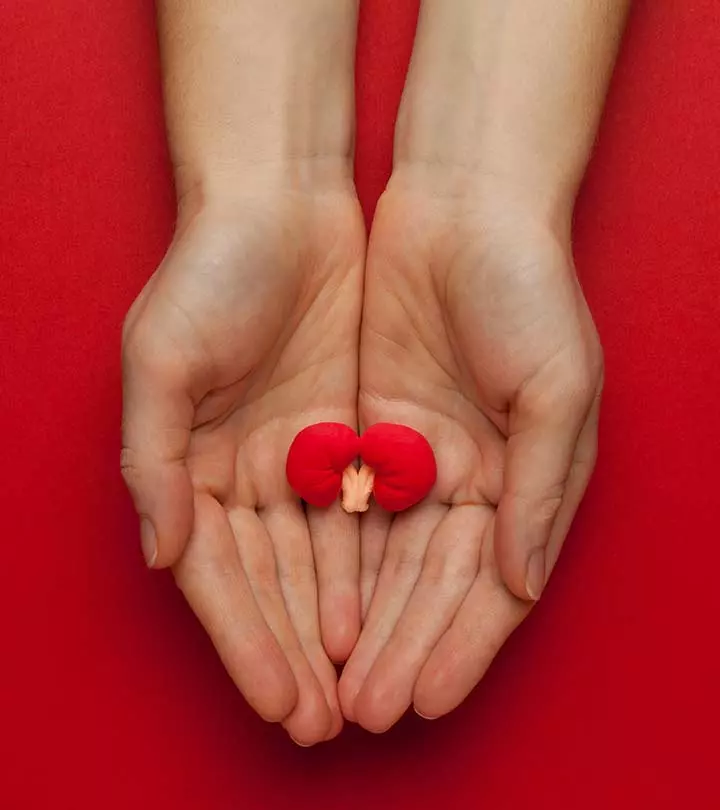

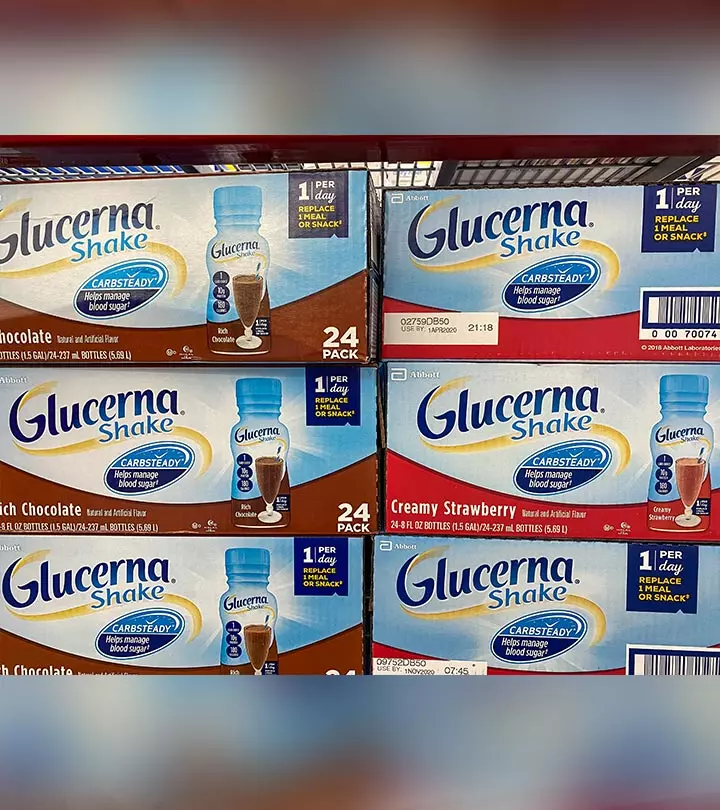
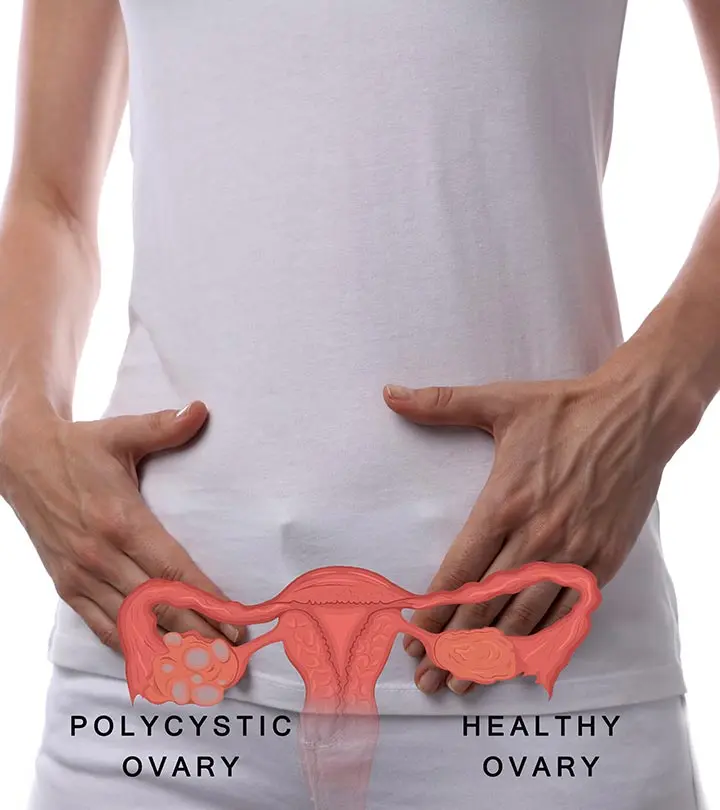

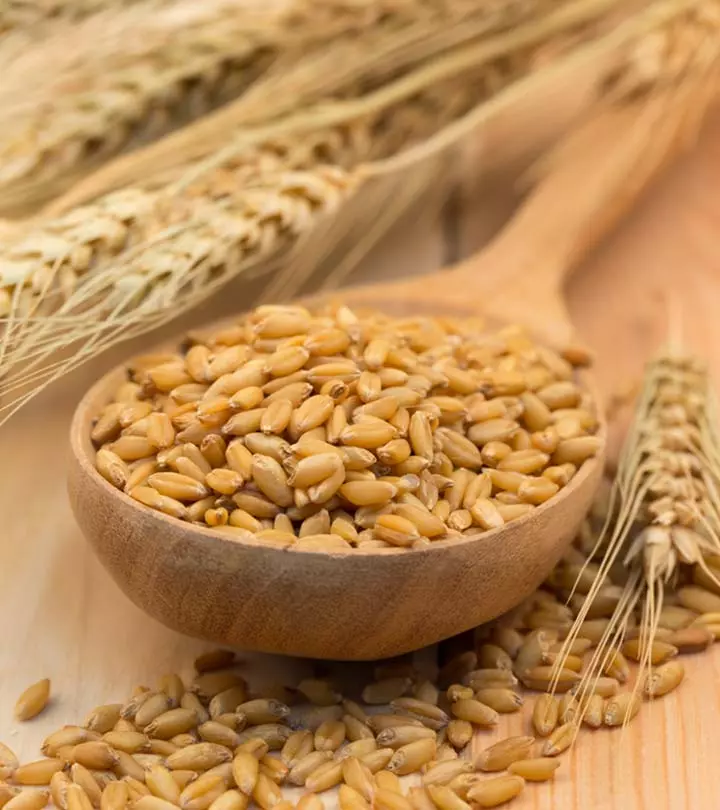
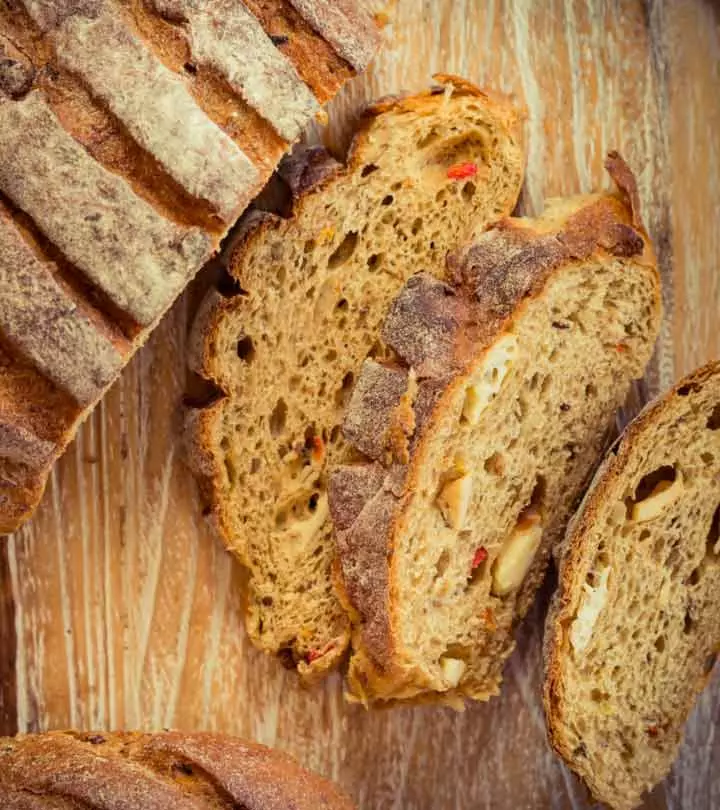
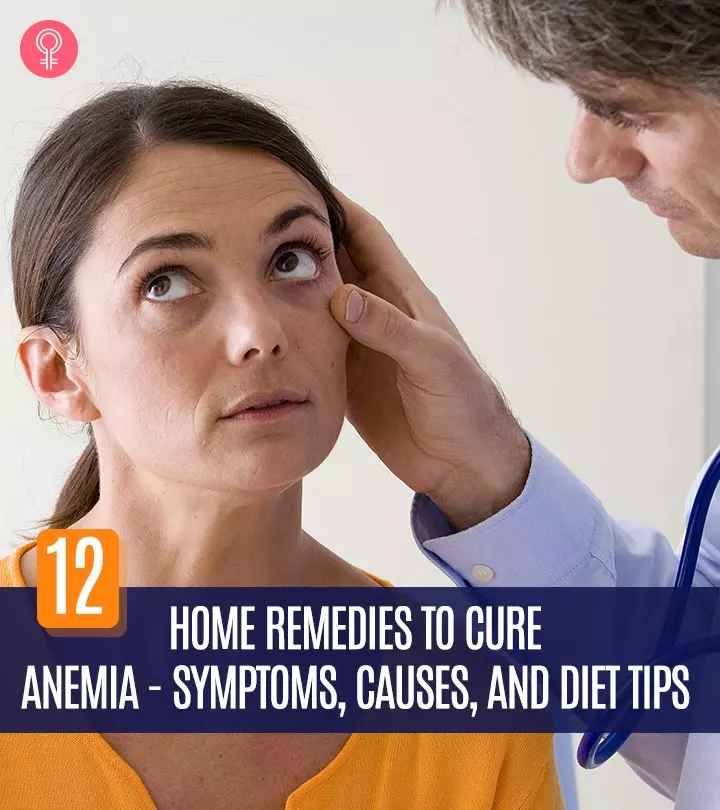
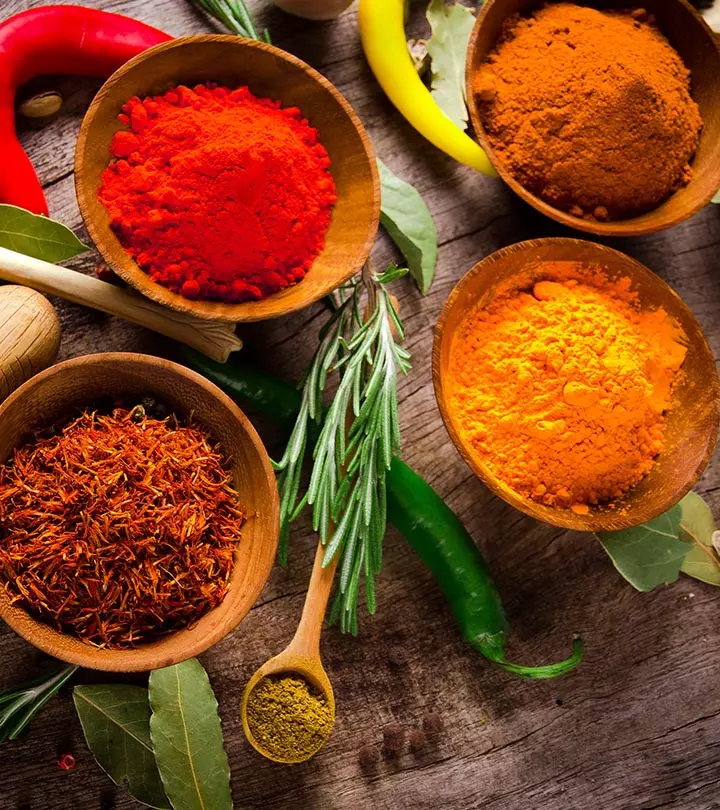
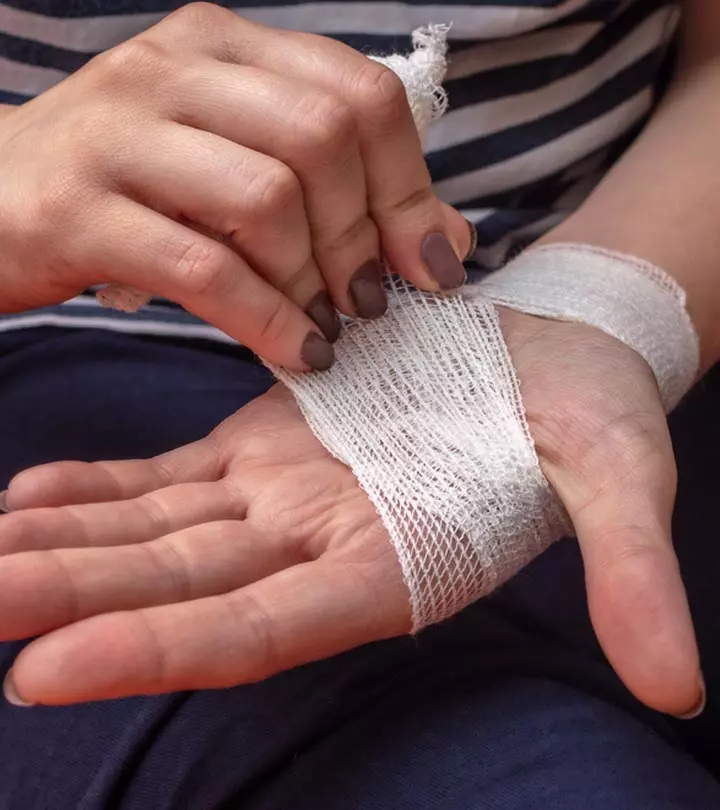





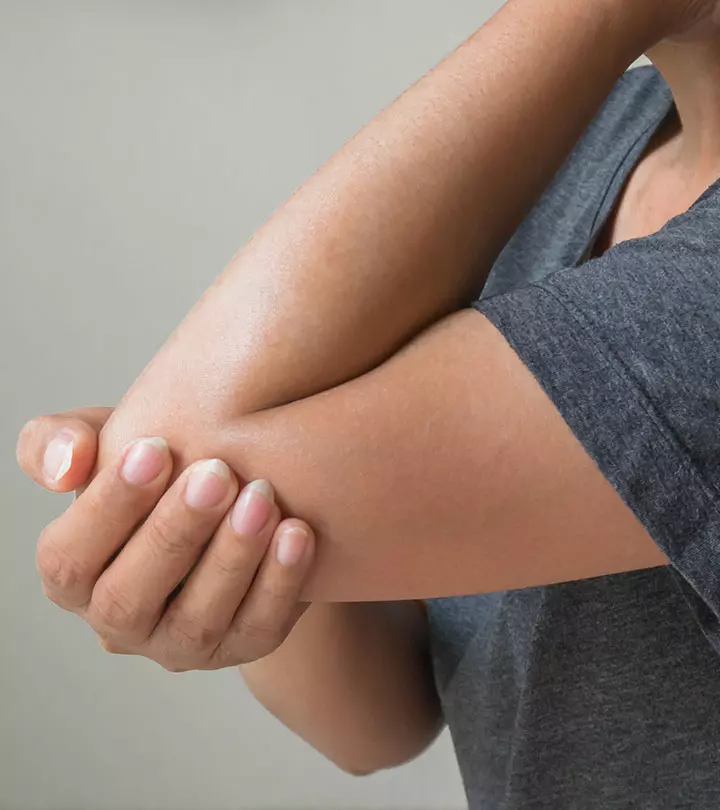
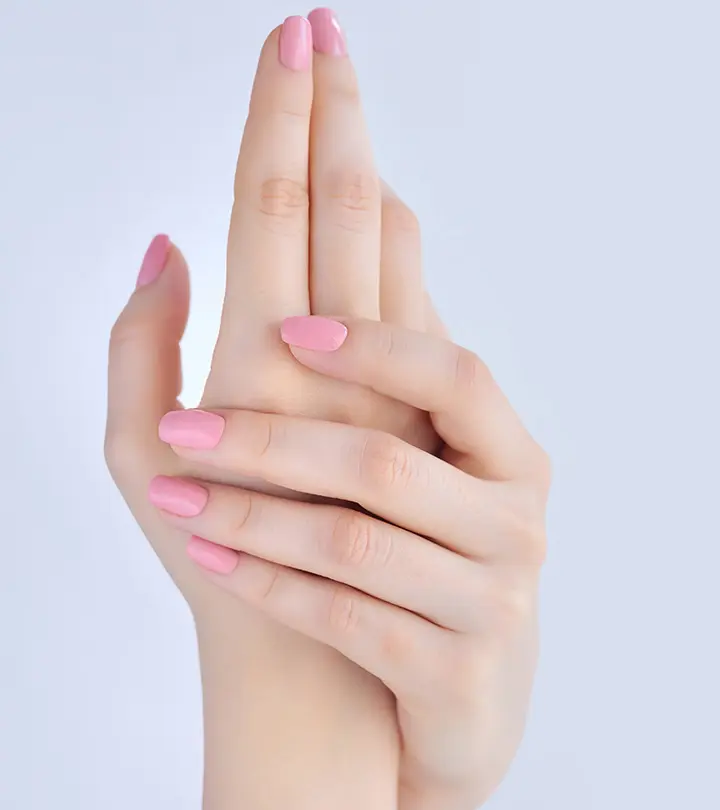



Community Experiences
Join the conversation and become a part of our empowering community! Share your stories, experiences, and insights to connect with other beauty, lifestyle, and health enthusiasts.